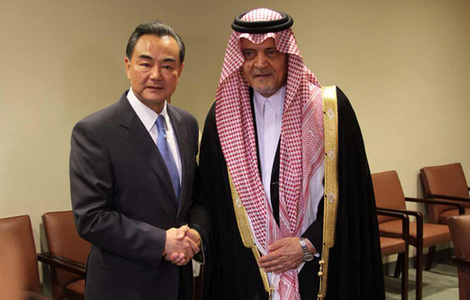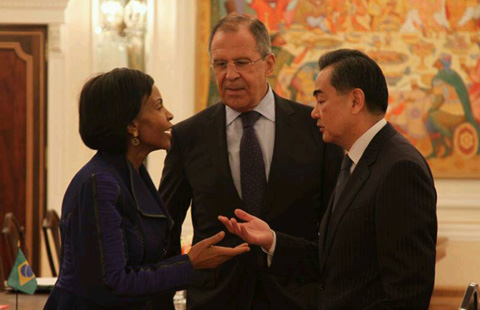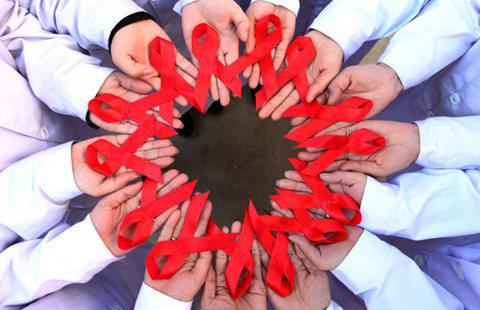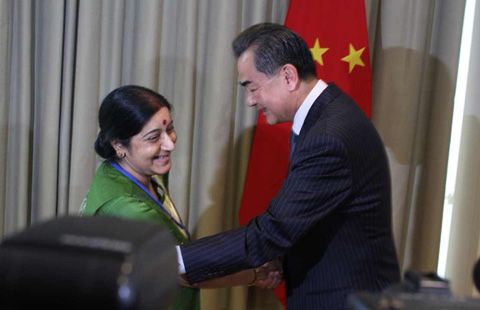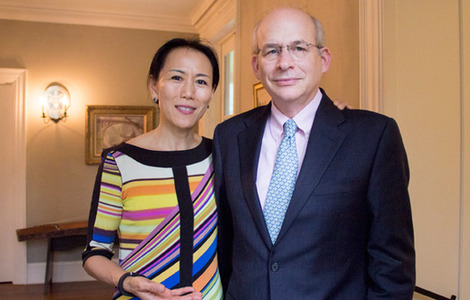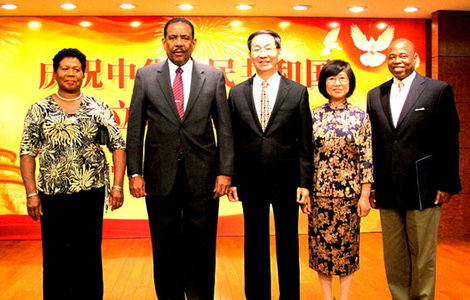FM calls for action on Ebola
Updated: 2014-09-26 14:53
By Zhang Yuwei at the United Nations(China Daily USA)
|
|||||||||
The growing threat posed by the West Africa Ebola outbreak requires the international community to take further actions to fight against the epidemic, said Chinese Foreign Minister Wang Yi at the United Nations headquarters in New York on Thursday.
Wang made the remarks at a high-level meeting on response to Ebola during the 69th session of the UN General Assembly.
"Epidemics know no borders, and Ebola is a common challenge for all countries around the world and all lives are equal," said Wang. "The international community should take further action to build up confidence, stay united in adversity and adopt resolute measures to contain the epidemic."
Wang urged the world to unite to form synergy to support the World Health Organization (WHO) and the UN in continuing with their efforts to mobilize global resources to combat the epidemic.
"It is important that we offer timely and needed help," said Wang. "All parties should send more medical workers, experts and protection equipment to the affected areas to help treat the infected, build up the capacity of epidemic testing and assist communities in disease prevention and control."
Since the breakout of Ebola in March, China has provided financial and material support as well as sending medical teams to the most affected West African countries including Guinea, Liberia, Sierra Leone and Guinea-Bissau.
China has sent more than 170 medical workers to the affected areas to fight on the front lines against the epidemic with local people, offering assistance including drugs, medical equipment and other disease prevention and relief materials.
This month, Chinese President Xi Jinping decided to send an additional package of assistance totaling 200 million yuan ($32 million) to relevant African countries, which includes food, materials and equipment and cash, said Wang.
"China so far has done a laudable job in supporting affected countries by sending badly needed health personnel and supplies. It is even more generous than some developed countries," said Huang Yanzhou, a senior fellow for global health at the New York-based Council on Foreign Relations.
"China will also give priority to health cooperation under the framework of the Forum on China-Africa Cooperation to help improve the disease prevention and control systems of African countries," said Wang, adding China will continue to provide additional assistance - including establishing treatment centers - to help combat the epidemic.
Huang said it is important for the international community to help invest in health infrastructure while helping with immediate medical help to treat Ebola.
"The international community needs to do more in addressing the crisis and eventually the virus will be burnt out," said Huang. "But it is equally important to start investing in the countries' debilitating public health infrastructure so that it has the ability to effectively respond to the next disease outbreak."
The epidemic has claimed more than 2,000 lives since the first outbreak was reported in West Africa in March. It was the first Ebola outbreak in West Africa and the largest outbreak experienced since the first human outbreak occurred in 1976.
The WHO forecasted last month that it would take nine months to reach this level of infection. It said nearly 10,000 of those would be in Liberia, 5,000 in Sierra Leone and nearly 6,000 in Guinea.
Speaking at the same meeting, US President Barack Obama called the Ebola outbreak a "growing threat to regional and global security" and declared it a national security priority because of its speed of spreading.
"This is more than a health crisis," Obama said. "If this epidemic is not stopped, this disease could cause a humanitarian catastrophe across the region."
More and faster responses are needed to fight the epidemic, said Obama. "Right now, everybody has the best of intentions, but people are not putting in the kinds of resources that are necessary to put a stop to this epidemic," he said.
Huang said defining the epidemic as a national security crisis could make it "more difficult" to track down and treat the infected cases.
"When the crisis is securitized, the enemy is no longer the virus but the people who carry the virus," said Huang.
"This could exacerbate the problem of lack of trust in the public health authorities - people will shun and even attack public health workers for fear of being locked up," he added.
yuweizhang@chinadailyusa.com
(China Daily USA 09/26/2014 page1)
Most Viewed
Editor's Picks

|

|

|

|

|

|
Today's Top News
China and US militaries work at building trust
Biz-Tech Forum in 2nd year
National Day celebrated
FM calls for action on Ebola
A warm-up for Paris meeting
Chinese donations to US lag behind
Extra points for exam over blood donation
100,000 officials were paid though they did no work
US Weekly

|

|
